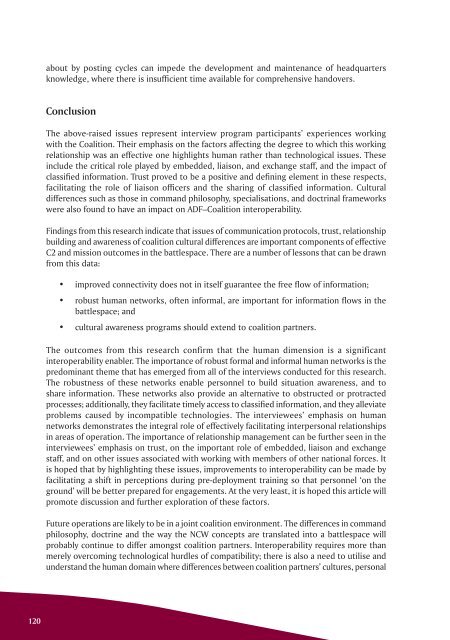ISSUE 176 : Jul/Aug - 2008 - Australian Defence Force Journal
ISSUE 176 : Jul/Aug - 2008 - Australian Defence Force Journal
ISSUE 176 : Jul/Aug - 2008 - Australian Defence Force Journal
You also want an ePaper? Increase the reach of your titles
YUMPU automatically turns print PDFs into web optimized ePapers that Google loves.
about by posting cycles can impede the development and maintenance of headquarters<br />
knowledge, where there is insufficient time available for comprehensive handovers.<br />
Conclusion<br />
The above-raised issues represent interview program participants’ experiences working<br />
with the Coalition. Their emphasis on the factors affecting the degree to which this working<br />
relationship was an effective one highlights human rather than technological issues. These<br />
include the critical role played by embedded, liaison, and exchange staff, and the impact of<br />
classified information. Trust proved to be a positive and defining element in these respects,<br />
facilitating the role of liaison officers and the sharing of classified information. Cultural<br />
differences such as those in command philosophy, specialisations, and doctrinal frameworks<br />
were also found to have an impact on ADF–Coalition interoperability.<br />
Findings from this research indicate that issues of communication protocols, trust, relationship<br />
building and awareness of coalition cultural differences are important components of effective<br />
C2 and mission outcomes in the battlespace. There are a number of lessons that can be drawn<br />
from this data:<br />
• improved connectivity does not in itself guarantee the free flow of information;<br />
• robust human networks, often informal, are important for information flows in the<br />
battlespace; and<br />
• cultural awareness programs should extend to coalition partners.<br />
The outcomes from this research confirm that the human dimension is a significant<br />
interoperability enabler. The importance of robust formal and informal human networks is the<br />
predominant theme that has emerged from all of the interviews conducted for this research.<br />
The robustness of these networks enable personnel to build situation awareness, and to<br />
share information. These networks also provide an alternative to obstructed or protracted<br />
processes; additionally, they facilitate timely access to classified information, and they alleviate<br />
problems caused by incompatible technologies. The interviewees’ emphasis on human<br />
networks demonstrates the integral role of effectively facilitating interpersonal relationships<br />
in areas of operation. The importance of relationship management can be further seen in the<br />
interviewees’ emphasis on trust, on the important role of embedded, liaison and exchange<br />
staff, and on other issues associated with working with members of other national forces. It<br />
is hoped that by highlighting these issues, improvements to interoperability can be made by<br />
facilitating a shift in perceptions during pre-deployment training so that personnel ‘on the<br />
ground’ will be better prepared for engagements. At the very least, it is hoped this article will<br />
promote discussion and further exploration of these factors.<br />
Future operations are likely to be in a joint coalition environment. The differences in command<br />
philosophy, doctrine and the way the NCW concepts are translated into a battlespace will<br />
probably continue to differ amongst coalition partners. Interoperability requires more than<br />
merely overcoming technological hurdles of compatibility; there is also a need to utilise and<br />
understand the human domain where differences between coalition partners’ cultures, personal<br />
120

















